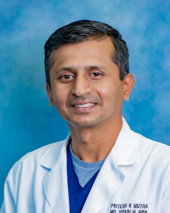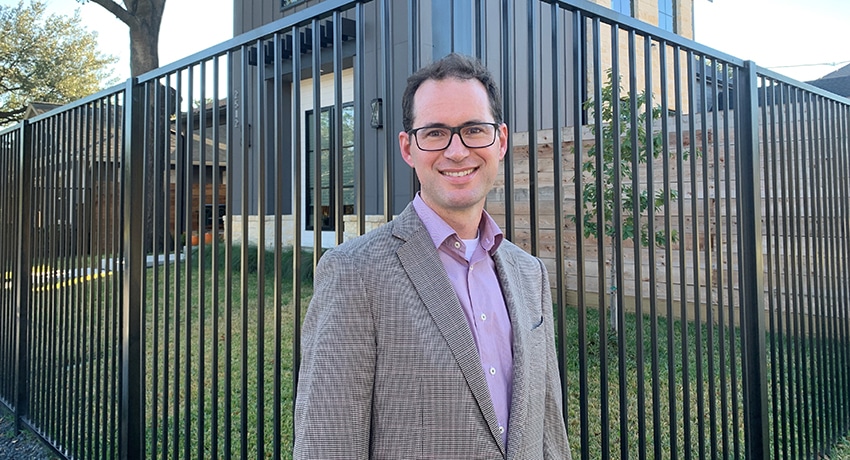Forty-nine-year-old Brian Blackburne of Houston suffered from chronic digestive problems for so long that antacid medicine became a staple of his diet.
“All my life I’ve never had a great stomach. I’ve had acid reflux from the time I was a teenager,” Blackburne said. “To treat the heartburn, I kept antacid in the bathroom, in the glove box, at work. I always had it.”
Blackburne lived this way until Oct. 3, 2022. That was the day he met Pritesh Mutha, MD, gastroenterologist with UT Physicians and associate professor of gastroenterology, hepatology, and nutrition with McGovern Medical School at UTHealth Houston.
“It was kind of a fluke,” said the retired technical-communication professor. “It was time to get another scope (endoscopy), so I scheduled an appointment. The doctor I requested wasn’t available, but Dr. Mutha was. After I read his profile online, which described his lifestyle approach to medicine, I decided to see what he was all about.”
The first visit
At the initial visit, Mutha, who is board certified in lifestyle medicine, first conversed with his patient to learn more about him.
“The first thing I did was jump on the exam table, but he invited me to sit with him and talk,” Blackburne said. “He really wants to know about your situation before he examines you.”
During their chat, Mutha gave Blackburne recommendations and asked about his diet.
“Dr. Mutha talked about properly chewing food so my stomach could efficiently process it and how to “belly breathe” to reduce stress on my stomach and make it easier to contain the acid,” Blackburne said. “We also talked about my general eating and drinking habits, from what I was eating for breakfast to how much caffeine I drank throughout the day.”

Mutha suspected the problem was with Blackburne’s “fuel,” not his “tank.”
“He had severe inflammation in his food pipe, but no ulcers or infection in his stomach were noted when I did the endoscopy,” Mutha said. “But clearly he was having severe symptoms. Often times the anatomy is fine, but the function is bad. This is usually due to diet and lifestyle.”
Packaged/processed foods and animal-derived products, such as meat, fish, dairy, and eggs, contain fat and even hormones and toxins, Mutha explained. They also do not have any valuable fiber.
“They cause inflammation and can even shut down the stomach. Putting the wrong type of fuel can make a car run, but it will not run well and will eventually break down,” Mutha said.
At the end of the examination, Mutha asked Blackburne if he would be interested in dietary suggestions.
“After I told him ‘yes,’ he brought me a document that summarized his general advice for eating, drinking, and breathing, and it listed the names of some articles, books, and movies on it,” Blackburne said. “He told me, ‘Start with the movies.’”
The new diet
When he returned home, Blackburne studied the list and discovered that everything on it was about adopting a low-fat, whole-foods, plant-based diet, also called low-fat WFPB diet.
“Being born and raised in Texas, I was definitely a meat eater and consumed it for at least two meals a day,” he said.
Intrigued, Blackburne watched the first item on the movie list, a documentary titled “Forks Over Knives.” What he learned would change his life.
The former educator read more about the topic and decided to adopt a new diet right away. Blackburne would remove all animal products from his diet and cut out all foods with oils, processed sugars, and added salt.
“I thought this might be a good experiment, so I decided to start immediately,” Blackburne said. “I also decided to eliminate caffeine and alcohol since Dr. Mutha said those played a big role in how I was feeling. I just thought, ‘I’ll give it a try and see what happens.’”
Blackburne began eating meals with unprocessed foods and plant-based proteins, such as tempeh, chickpeas, and various canned beans. He was also sure to stock a variety of fresh and canned vegetables.
A lifelong snacker, Blackburne kept an assortment of fresh fruit. He also learned to make hummus and other plant-based dips to eat with whole-grain bread or vegetables.
He was able to purchase all the foods he wanted at his regular grocery store and did not need to go to a specialty grocer. However, Blackburne did begin reading the labels more carefully.
“I didn’t realize how much oil or processed grains and sugars are in everything,” Blackburne said.
The health results
Just two weeks later, Blackburne returned to see Mutha for a scheduled procedure. He gladly reported that the doctor’s recommended lifestyle changes greatly reduced his acid reflux.
“I told Dr. Mutha I was doing the things he’d recommended, including the low-fat, whole-foods, plant-based diet. He was excited to know that I was having success and that I was sticking with it,” Blackburne said. “I told him it made a huge difference in the way I felt. I hardly needed to take antacids anymore.”
Mutha’s recommended diet changes not only alleviated Blackburne’s digestive issues, but they also improved his “numbers.”
When Blackburne received his bloodwork results from a physical exam on Nov. 12, the numbers astounded him. His total cholesterol dropped 56 points, his triglycerides (blood fat) dropped 58 points, and his LDL (bad cholesterol) dropped 39 points. It was a 25%-35% drop from one month to the next!
“I went through my medical records as far back as 2003, and these were my best numbers in 19 years! I had to email Dr. Mutha and thank him. No one else ever taught me what he had,” Blackburne said.
Mutha was thrilled — but not surprised — to learn of his patient’s improved overall health.
“The GI tract, or your gut, is the seat of your immune system,” Mutha said. “Whatever is good for your gut is good for everything.”
It took Blackburne less than a week to break his chronic acid reflux and less than six weeks to see measurable progress in his blood. The impressive outcomes have given Blackburne more incentive to continue the path.
“I feel much better now. I think I’ve taken seven tablets of antacid in six weeks. I used to take two or three tablets a day,” he said. “I’ve also been able to stop taking my blood pressure medicine. I don’t need it anymore. I check my blood pressure daily, and it hasn’t been this low since high school.”
His lifestyle changes also came with a bonus.
“I haven’t increased my exercise, yet I’ve lost 12 pounds. That’s an added perk,” Blackburne said. “Now I’m going to start exercising more regularly so I can hopefully see even more improvements.”
The drawbacks and benefits
The first nine days of his low-fat WFPB diet were challenging for him, but Blackburne has no regrets.
“I thought the hardest part would be missing meat. I don’t miss it at all. It doesn’t even cross my mind,” he said. “The hardest for me was quitting the sugar and junk food. Dr. Mutha said that these substances were as addictive as caffeine, and he was right! I had headaches from the withdrawal, and my legs were killing me. Things started to get better after a week, but I didn’t know you could get body aches after breaking from sugar.”
He now spends more time grocery shopping and meal planning, but he spends less time cooking — a fair trade in his opinion.
“Cooking is easier now. You don’t have to thaw meat or worry about cross-contaminating utensils. Because most of the food is fresh, you also don’t have as much trash to take out after a meal,” Blackburne said. “There are also so many recipes you can find on websites and apps to keep meals interesting. I don’t consider myself a cook, so if I can do it, anyone can.”
The partnership
Though he will not need to return for another endoscopy or colonoscopy for 10 years, Blackburne will still see Mutha again for a six-month follow-up because he wants to maintain a dialogue about his lifestyle modifications.
“To me, what’s been most exciting is meeting someone who would introduce me to all this information, because no one else ever did. I wouldn’t be where I am today if I had not met Dr. Mutha,” Blackburne said. “I’d still be doing things that upset my stomach and surviving off of antacids.”
“My goal is to empower patients with knowledge,” Mutha said. “I do not push anything on them. I just want to make sure that when they step out of my office, they have the right knowledge and resources. What they do with it is up to them. I always provide the resources so they can make their own choices. That is exactly what Brian did.”
“My goal is not just for the patient’s symptoms to improve. It is to eradicate the disease from the root cause and get them healthier and medicine-free,” Mutha added.
Blackburne appreciates how Mutha practices both gastrointestinal and lifestyle medicine to treat, reverse, and prevent diseases.
“He’s a gastroenterologist who could recommend surgery or prescribe the latest reflux medications, but his goal is to help me avoid medical interventions of any sort,” Blackburne said. “I look back and think, ‘I almost didn’t even see Dr. Mutha.’ It was a chance encounter, and now it’s literally changing my life. I can’t thank him enough, and I would recommend him to anyone seeking a gastroenterologist.”



